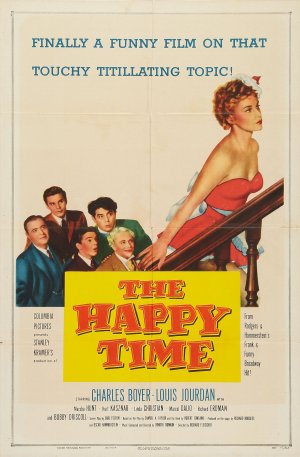
THE HAPPY TIME
US, 1952, 94 minutes, Colour.
Charles Boyer, Louis Jourdan, Bobby Driscoll, Marsha Hunt, Linda Christian, Kurt Kasnar, Marcel Dalio.
Directed by Richard Fleischer.
The Happy Time is quite a pleasant family comedy drama about Ottowa in the 1920s. With some period recreation of atmosphere, the film shows a French- Canadian family with its ups and downs, especially focussing on a young adolescent boy very well played by Bobby Driscoll, tne star of many Disney films and The Window. Charles Boyer and Louis Jourdan are well at home in this kind of Gallic sentiment. Marsha Hunt is attractive as the boy’s mother. The film is quite episodic but has a lot of charm and a lot of family wisdom. It was produced by Stanley Kramer during his period of active production of small budget features which were so excellent in the early 1950s like The Member of the Wedding. The film was directed by Richard Fleischer who in the 60s and 70s proved a very competent director turning his hand to all kinds of films from Fantastic Voyage, Dr Dolittle, Tora Tora, Tora.
1. The significance of the title? Its reference to the happy time of the Bonnard family, the 1920s, Bibi and his birthday? Indication of the tone of the film?
2. The French- Canadian setting? The atmosphere of the twenties, the Gallic atmosphere and the way this was presented - in song, language, echoes of traditional French manner? The presentation of the family itself, the various generations? The emphasis on the men? The emphasis on humour? The humorous variations on the theme? How serious did the film become with its emphasis on Bibi’s growing up? The blending of the humorous and the serious?
3. The black and white photography, creation of atmosphere? The musical score and its appropriateness? The significance of the opening song and its French tone?
4. How plausible was the plot? A glimpse at a typical French-Canadian? family? The role of Jacques Bonnard and his place in the family, his love for his wife Susan? The picturing of the sequences between them and the bonds of self-acceptance and love? His work and the humorous overtones of his music and the magic? The older generation with the grandfather and his being supposedly typically French? Uncle Desmond and his flirtatious attitude? Bibi growing up within this atmosphere? The presentation of the maid, the neighbours, the relations, life at school? Bibi’s difficulty in his being curious about growing up, puberty, love? his experiences at school, the magazine, the maid and the night? How authentic an exploration of family life?
5. The focus on the parents: the personality of Jacques Bonnard, his role in the home and his influence, his care for his son, his love for his wife Susan and her motherly attention to Bibi?
6. Grandfather and the humour of the old man still flirting? The widow? The contrast with Uncle Desmond and the implication that he was really like Grandfather? His reputation? His acting it out? His flirting with Mignonette? Her reaction to him and being cautious? The humorous complications with Bibi kissing her and her reaction to Deamond?
7. The character of Bibi? how was he a focus for the film? The re-creation of a twelve-year old boy and his problems? His happiness in the house, relating well to everybody, incidents - his friendships in the street, with the neighbours? His curiosity? The reading of the magazine and his being caught? The harshness of the punishment? The infatuation with Mignonette and the sequence of his kissing her in the night? The disappointment and the having to face reality? His father giving him sex instruction at the end? A serious tone to the light touch?
8. The neighbours and the relations? especially Uncle Louis, his wife and their continued quarrelling, the drinking? The importance of their daughter and her suitor? The humour of the putting on a show for the suitor and the accident of his getting drunk? The humorous interview between Uncle Louis and Alfred? His return and the possibility of marriage with Faber?
9. The supporting cast and the various characters of the street, the school, of the city? Jacques' place of work and the personnel there? The headmaster?
10. Themes of human life, family, growing up, relationships? How humorous and how wise the insights?